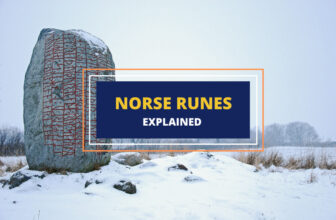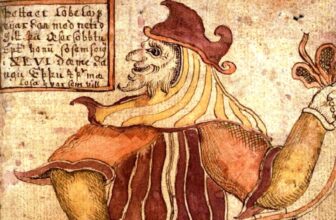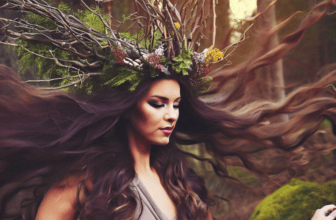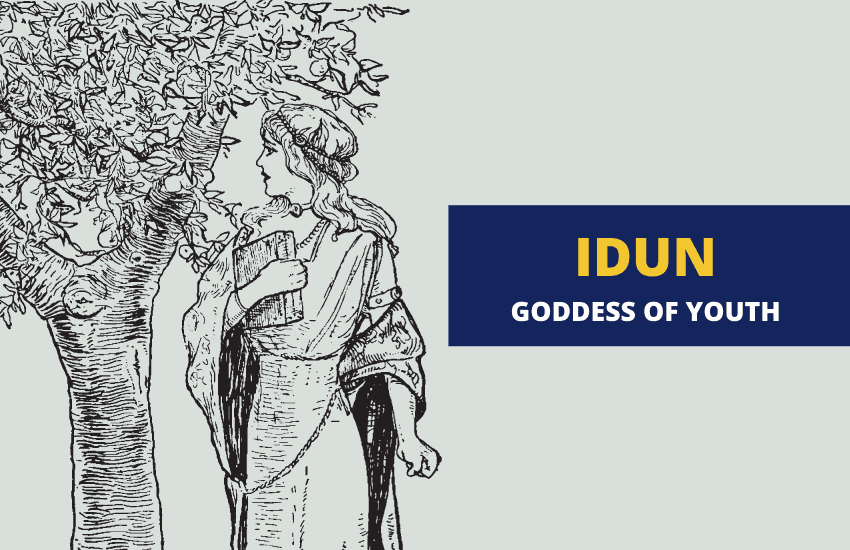
Table of Contents
In Norse mythology, Idun is an important deity, who plays a significant role in the myths. A goddess of youth and renewal, Idun is the goddess that bestows the gods with immortality. However, despite her importance, there’s very little information about Idun and she remains one of the more obscure of the Norse gods.
Who is Idun?
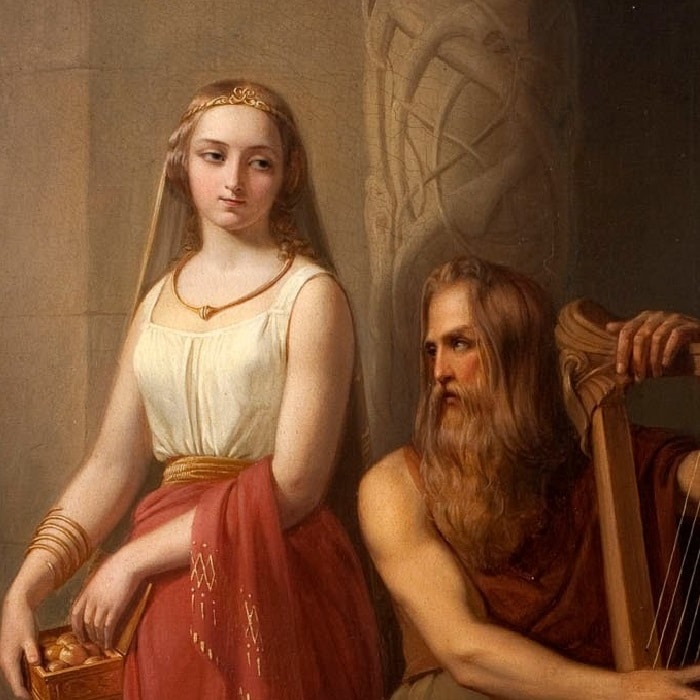
Idun’s name (spelled Iðunn in Old Norse) translates to Ever Young, Rejuvenator, or The Rejuvenating One. This signifies her association with youth and immortality.
A goddess of youthfulness and a wife to the god of poetry Bragi, Idun is described as a young and beautiful maiden with long hair, an innocent look, typically holding a basket of apples in her hands.
Idun’s Apples
Idun is most famous for her special apples. While these fruits, called epli, are usually interpreted as apples, they could be any type of fruit since the English world apple doesn’t come from the Old Norse epli.
Either way, what’s special about Idun’s epli is that they are the fruits that gave the gods their immortality. The gods had to eat these apples if they were to preserve their youth and enhance their longevity. This is a fascinating concept for two different reasons:
- It makes Idun one of the most important gods in the Norse pantheon as without her the other gods wouldn’t be able to live as long as they do.
- It humanized the Norse gods even further as it means that they aren’t naturally immortal – they are just powerful living beings.
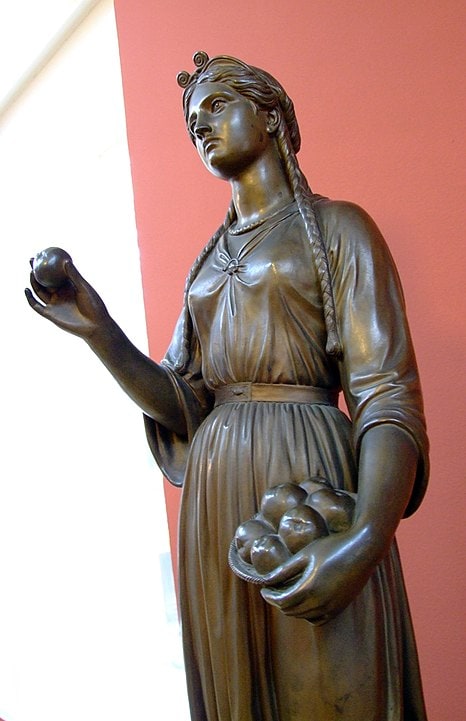
Idun’s apples don’t explain the longevity of other beings in Norse myths such as the usual enemies of the gods – the immortal giants and the jötnar. It’s also not explained how the gods survived for as long as they did before Idun was born.
At the same time, it’s not really clear when Idun was even born or who her parents were. She seems a rather young deity historically, and so is her husband Bragi. However, she could very well be older.
The Kidnapping of Idun
One of the most famous Norse myths and certainly Idun’s most well-known legend is The Kidnapping of Idun. It’s a simple tale but it clearly showcases the importance of the goddess to the rest of the Æsir/Aesir gods.
In the poem, the giant Thjazi captures Loki in the woods in Jötunheimr and threatens to kill the god unless Loki brought him Idun and her fruits. Loki promised and returned to Asgard. He found Idun and lied to her, telling her that he had found fruits in the forest that were even more marvelous than her epli. The trustful Idun believed the trickster god and followed him into the woods.
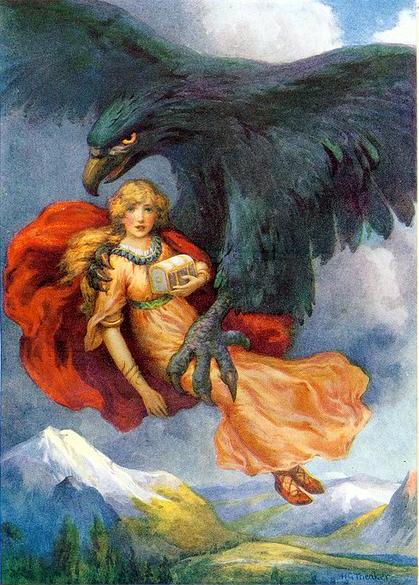
Once they were near, Thjazi flew over them disguised as an eagle, and snatched Idun and her basket of epli away. Loki then returned to Asgard but was confronted by the rest of the Æsir gods. They demanded that Loki bring Idun back as all their lives depended on it.
Forced to go back into the woods once again, Loki asks the goddess Freyja to lend him her falcon shape. The Vanir goddess agreed and Loki transformed himself into a falcon, flew to Jötunheimr, grabbed Idun in his talons, and flew away. Thjazi transformed into an eagle again and gave chase, quickly gaining on the falcon and the goddess of rejuvenation.
Loki managed to get back to Asgard just in time, however, and the Æsir gods raised a barrier of flames just behind him, causing Thjazi to fly straight into it and burn to death.
What’s interesting is that although this is Idun’s most famous story, she doesn’t play an active role in it. She isn’t treated so much as a character, let alone a protagonist, in her own tale but rather as just a prize to be captured and recaptured. However, the poem does emphasize the importance of the goddess to the entire pantheon of Norse gods and their survival.
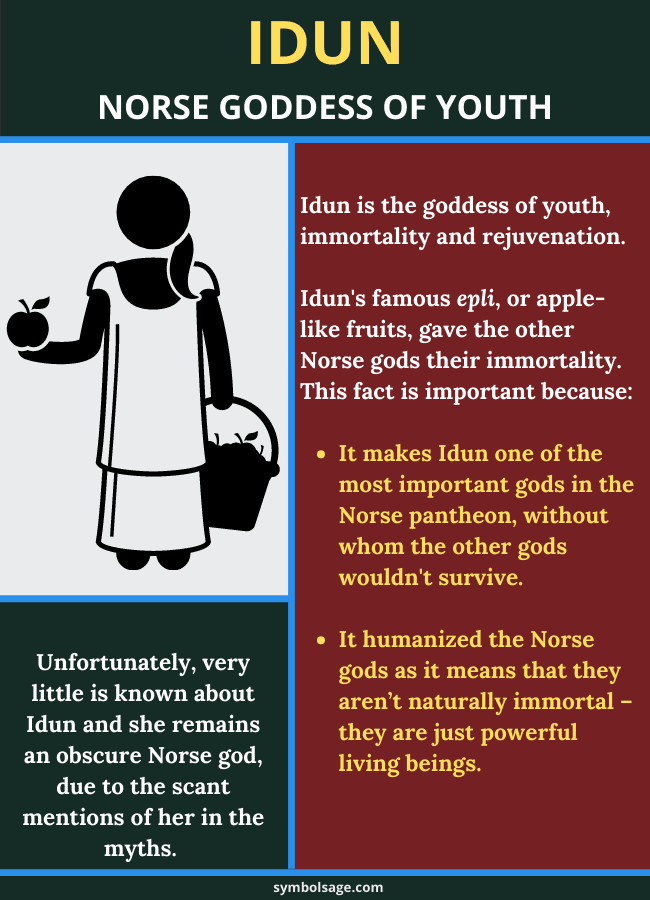
Symbolism of Idun
As a goddess of youth and rejuvenation, Idun is often associated with spring and with fertility. These associations are mostly theoretical and there isn’t much evidence to suggest that this was actually the case. In the Norse myths themselves, her meaning is mostly focused on her epli.
Many scholars have looked for comparisons between Idun and Indo-European or Celtic deities but these are also theoretical. Some theories draw a parallel between Idun and the Nordic Vanir goddess Freyja – herself a goddess of fertility. As the Vanir deities are the more peaceful counterparts to the war-like Æsir that connection is plausible but still just theoretical.
Importance of Idun in Modern Culture
As one of the more obscure Norse deities, Idun isn’t often featured in modern culture. She has been the subject of many poems, paintings, and sculptures in the past. In recent years, there hasn’t been much emphasis on Idun in literary works.
Richard Wagner’s opera Der Ring des Nibelungen (The Ring of the Nibelungs) featured a goddess called Freia which was a combination of the Vanir goddess Freyja and the Æsir goddess Idun.
Wrapping Up
Idun is an interesting figure in Norse mythology. She holds great importance as she is in control of immortality through her apples, but at the same time, the scant mentions of her in Norse mythology makes her an obscure and little-known deity.





